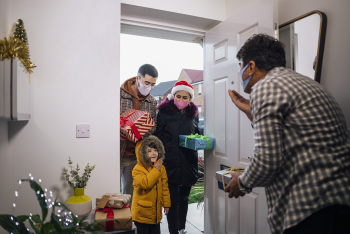Long COVID refers to a range of persistent symptoms that can linger for weeks, months or years after...
Read More

Similar to those who have allergies, people with asthma often experience worsened symptoms as the spring season comes, bringing warmer weather and an increased presence of allergens.
This spring season, a new set of challenges faces the asthmatic community—COVID-19. The Centers for Disease Control and Prevention (CDC) has warned that people with asthma may be at a higher risk of getting “very sick” from contracting COVID-19.
“As COVID-19 affects the respiratory tract—your nose, throat and lungs—it increases the risk of people with asthma having an asthma attack,” said Sarah Davis, M.D., a board-certified Primary Care physician with Inspira Medical Group. “It can also lead to pneumonia or acute respiratory distress syndrome (ARDS).”
Here are two key steps that people with asthma should take to best prepare themselves for the spring season, as well as COVID-19, according to Davis.
Many of the common triggers of allergies, items like pollen, dust and pet dander, are also triggers for asthma. What triggers asthma attacks varies from person to person, as do the symptoms that come as a part of the attacks.
“For many people with asthma, their triggers are consistent for the duration of their life, but the symptoms can change frequently,” said Davis. “An allergist can conduct tests to determine specific triggers, which can be helpful in knowing what to avoid.”
Depending on the individual, symptoms of an asthma attack can present in a variety of ways. Some of the most common include shortness of breath, intense, sudden chest pain and trouble sleeping due to an inability to catch your breath. In a time where COVID-19 is presenting new challenges on a daily basis, it’s more important than ever to have a clear handle on what can irritate your asthma.
While this may sound like a daunting task, an asthma action plan is more effective if developed and revised before it has to be used. An asthma action plan consists of the following steps:
Inspira Health is committed to keeping you updated on our state of readiness, the latest information on COVID-19, closures and the status of our services provided at our 150+ access points. Learn more about Pulmonology and Respiratory Health on our website or call 1-800-772-2848, 8 a.m. to 4:30 p.m. weekdays.

Long COVID refers to a range of persistent symptoms that can linger for weeks, months or years after...
Read More
A Very COVID Christmas: How to Celebrate Safely
Read More
After more than two years of masks, social distancing and travel restrictions, this winter is likely...
Read More
The material set forth in this site in no way seeks to diagnose or treat illness or to serve as a substitute for professional medical care. Please speak with your health care provider if you have a health concern or if you are considering adopting any exercise program or dietary guidelines. For permission to reprint any portion of this website or to be removed from a notification list, please contact us at (856) 537-6772